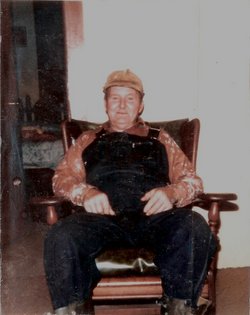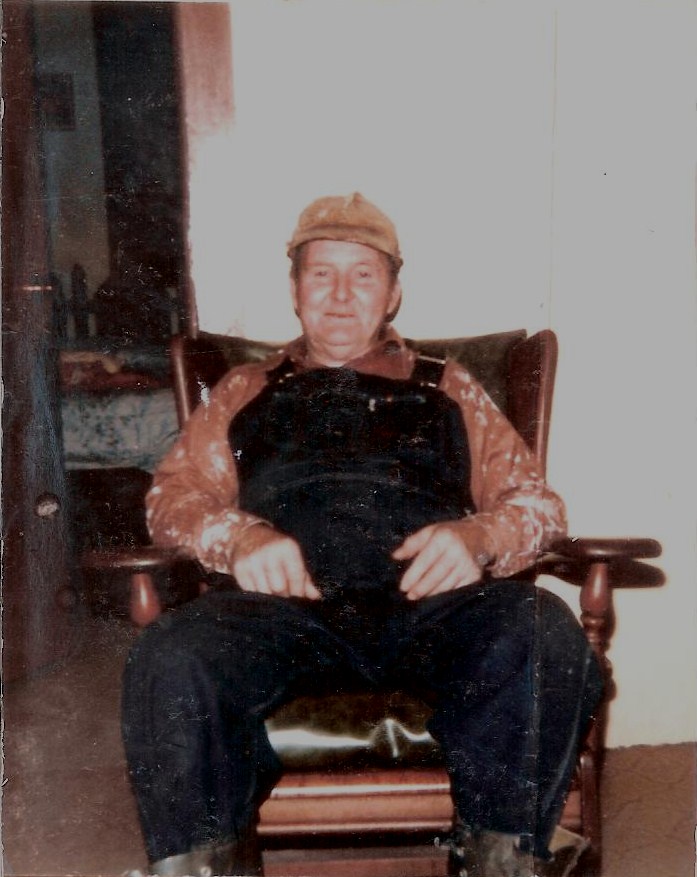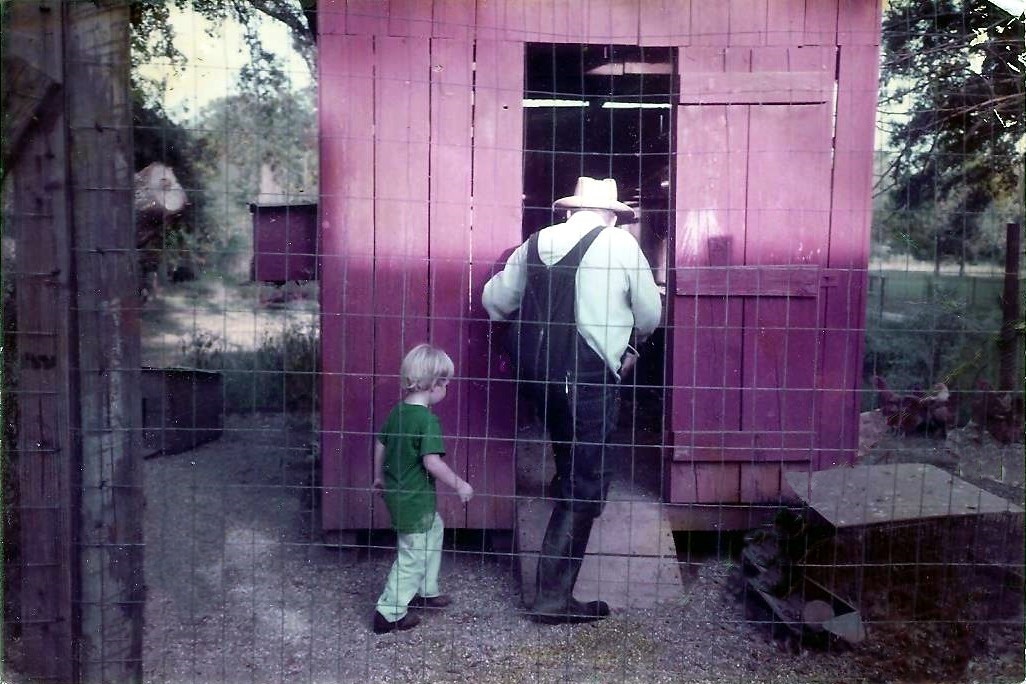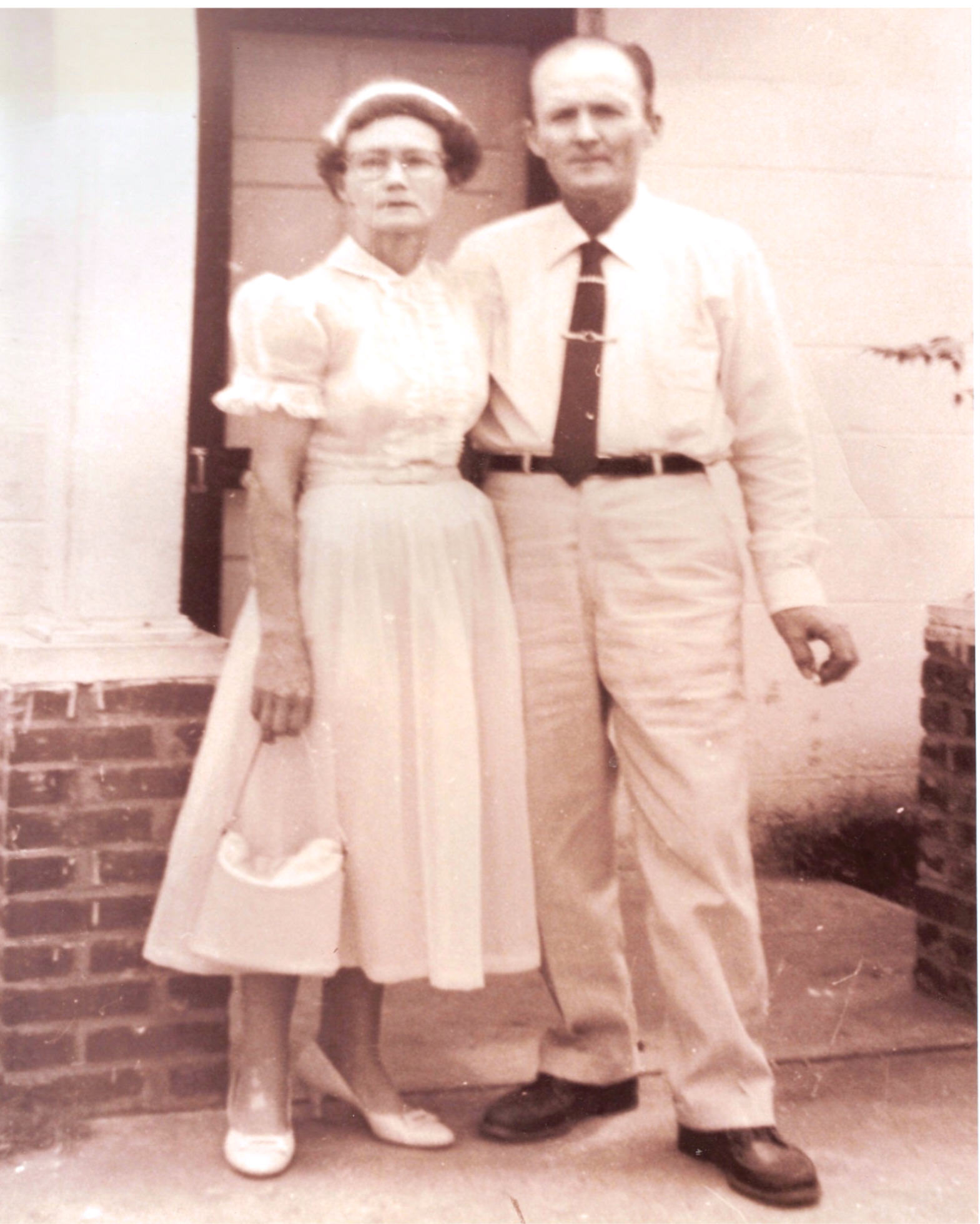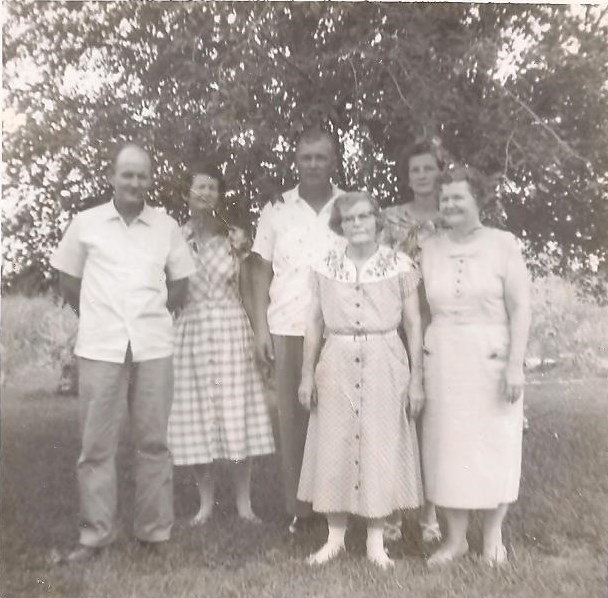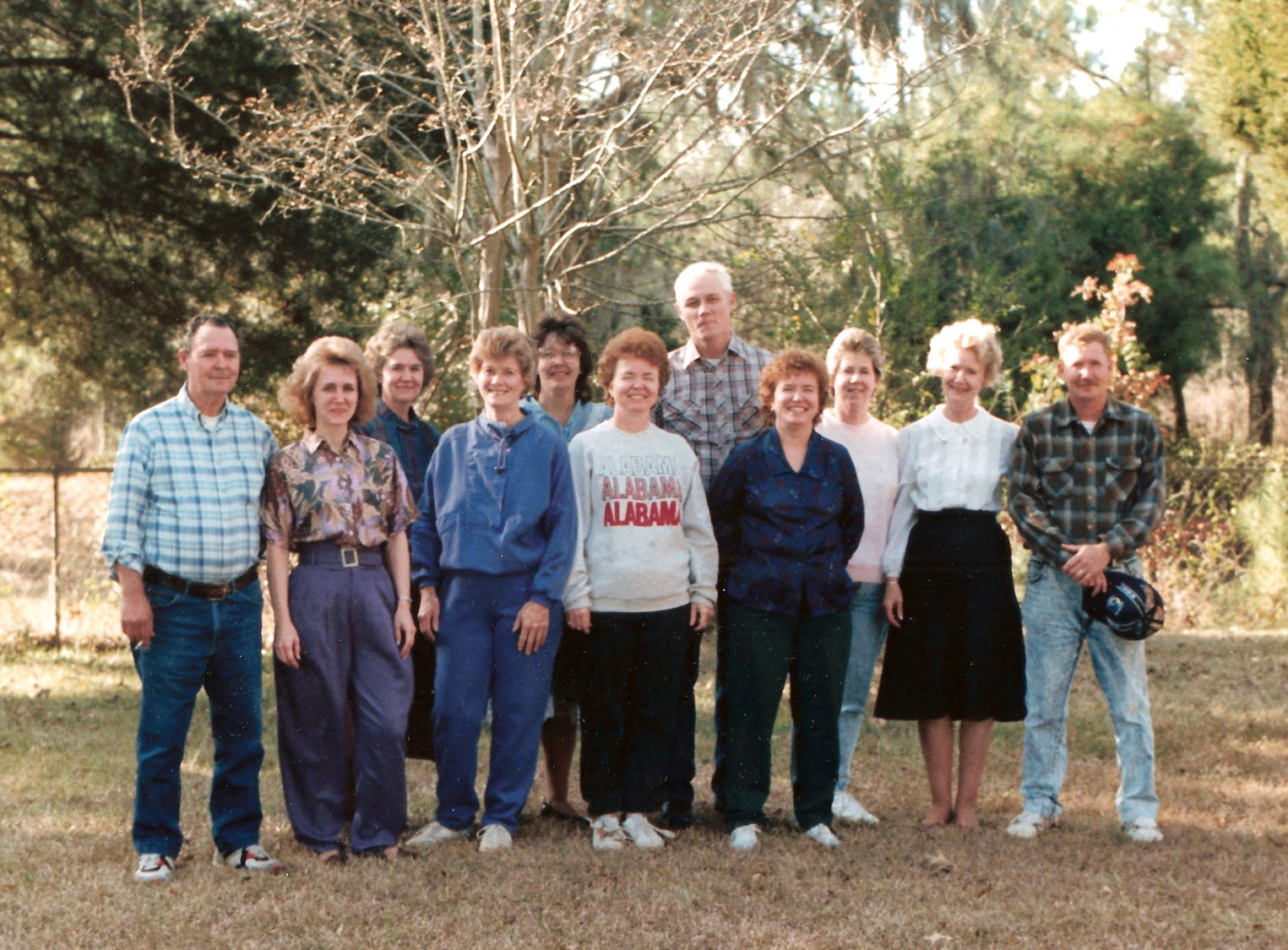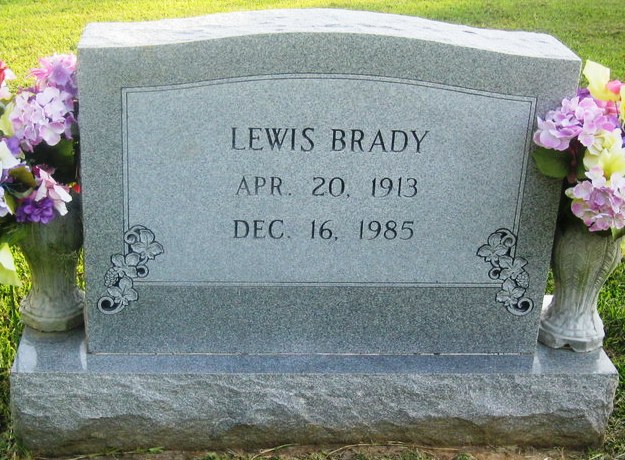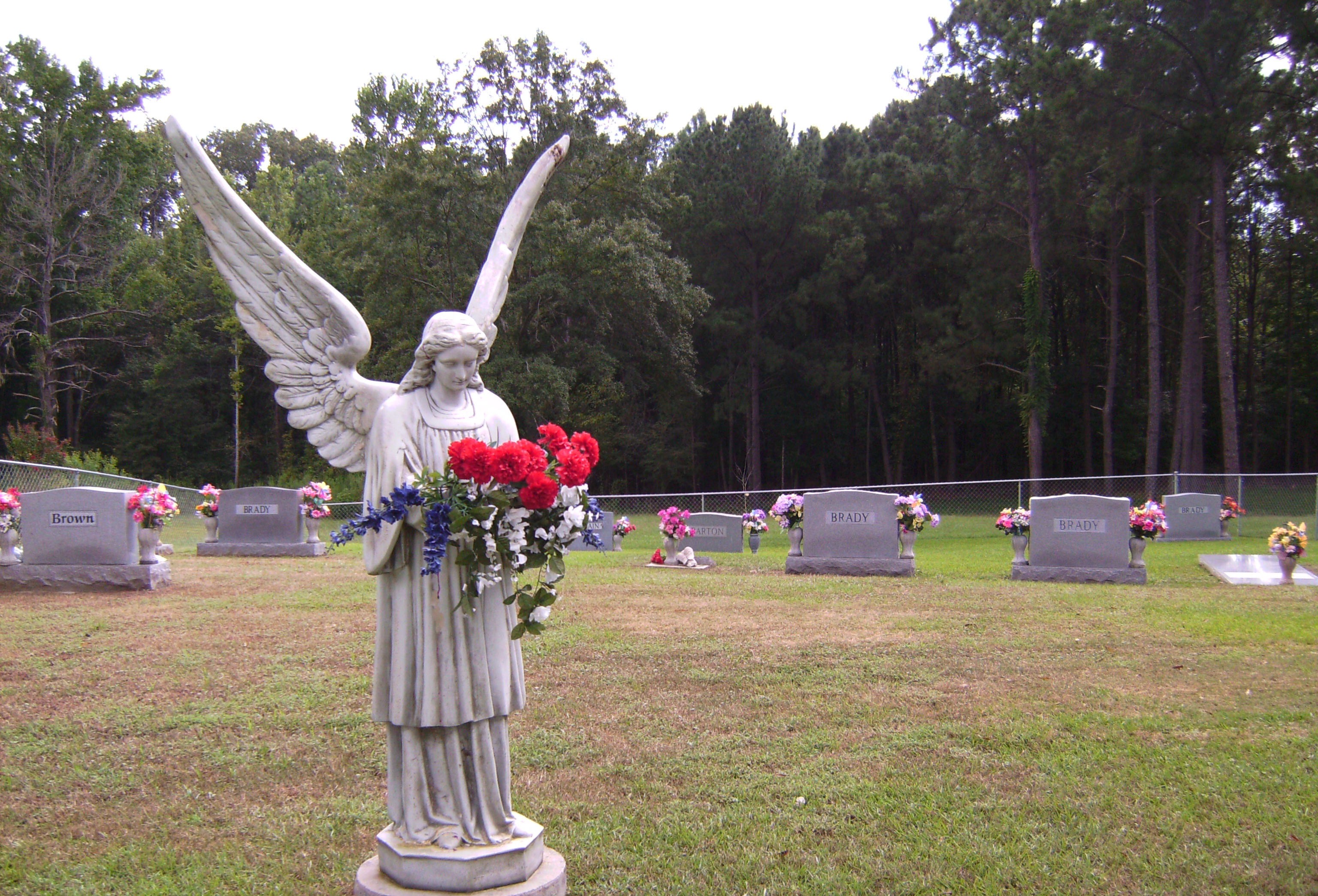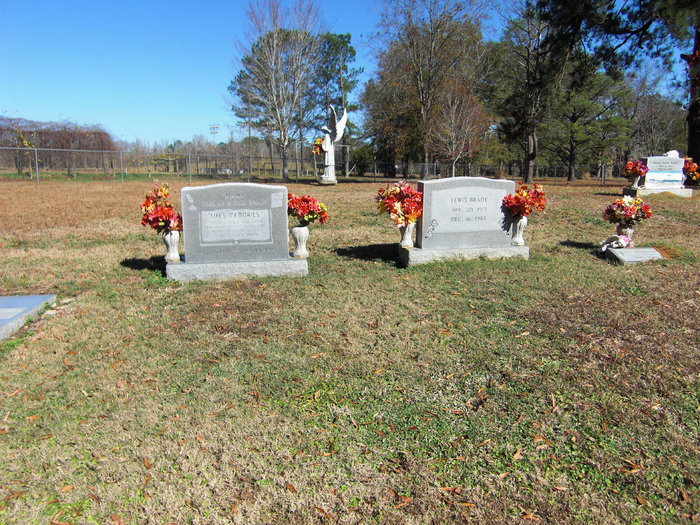***** DADDY *****
Daddy's hands were kind when I was crying,
But hard as steel when I'd done wrong.
Daddy´s hands weren't always gentle,
But I've come to understand,
There was always love in Daddy's hands.
**************************************************
Lewis Brady was born to Daisy Anderson Brady and Shilton Uriah Brady and was the fourth child and second son of six children; Frank, Fannie, Clara, Lewis, Louise and Charles. From early childhood Lewis learned the value of working hard which he continued to do for the rest of his life. In later years, he would tell his own sons tales of the things he and his older brother would do to get back at their younger brother who he said was a spoiled mama's boy, constantly running to her to tattle on them. He enjoyed recounting these stories to his own sons and would still laugh about it so many years later.
At the age of twenty-two, Lewis met and married Thelma Burke, aged eighteen, who was an orphan since the age of three when both of her parents died, and had lived in foster homes for most of her life. Lewis and Thelma were to have eleven children; eight girls and three boys. Daisy Anne was their firstborn, followed a year later by James "Buddy" Lewis who was to remain the only boy in the family for several years. Four girls followed, June Clara, Dannie Patricia, Verba Lee and Sarah Elizabeth. Finally another boy, Lawrence David, came along before two more girls, the twins, Sandra and Sharon. The third son, Allen Anderson, was followed by their last baby girl, Carol Dianne.
Lewis was first and foremost a farmer, but was also a carpenter, house painter and general contractor. He also did trapping in the winter to help supplement the family income. When he was trapping, it was not unusual for him to be in the woods long before daybreak on cold winter mornings, walking up to fifteen miles a day along the creek beds, coming home several hours later to begin his regular daily work. Lewis was well respected in the community, known to all as an honest, hard working, trustworthy man. Everyone in the community knew that if Lewis gave you his word on any thing, you could always depend on it. His word was his bond.
Buddy, being the only boy old enough to help out with the farm work and chores worked in the fields as soon as he was old enough, until at the age of seventeen, he enlisted in the Navy. Lewis missed having him at home to help out, so he worked even harder, up long before daybreak until well after dark and was never idle. In addition to his other jobs, he had a large garden where he grew all of the vegetables for the family, and took care of feeding the chickens, cows, and hogs, which were daily chores. He, being the dutiful son, and the only child who lived close by his mother, also took care of her needs.
Thelma had her hands full, taking care of the home and children, and being the good seamstress that she was, made clothes for all of them. Times were hard, but they did their best to make Christmas special for the children, using some of the money that Lewis made from his trapping during the winter months. It also helped to buy clothes, shoes and school supplies for the children. During those times, parents had to buy all of their children's school books each year and pay school fees for each child.
There were goods times enjoyed by the children too in the summer time. After the peanuts were harvested and dried on the vines, Lewis would pile them into a large shed he had built and it would be full almost to the top, where they would sit on top of the pile and pick the peanuts off the vines, with the promise that they could each keep one-fourth of all they picked. There were also the hay bales that were stacked in the back of the old barn that they would sneak into and move the bales around to make a tunnel with a hole in the middle. He wasn't too happy when he found that little hide-out. They would also "borrow" his hammer and nails to build a tree house, or take one of his plow ropes to the woods and toss it over a tree branch to swing across a small creek. Sneaking watermelons out of the patch on a hot summer day was also exciting, as well as roaming through the woods, picking blackberries, plums, and apples too when they could be found in some neighbor's apple tree, and then going for a swim in a pond close by. It didn't matter whose property they were on because it was all just free open range to them until Lewis heard about it later and then it mattered a lot. Today they would all be classified as juvenile deliquents, but they were really quite well-behaved, especially when they were sitting in church on Sunday all dressed up and behaving like little angels.
As some of the children grew older, Thelma got a job in Montgomery at the Ideal Café on Dexter Avenue, working as a waitress to supplement the family's income. She rode the Greyhound bus to work at five in the morning and sometimes did not get home until the bus dropped her off around ten at night. Their financial situation improved and she was able to help buy many of the things they needed but had not been able to afford. When it was cold or rainy, Lewis would go out and wait for the bus so that she did not have to stand outside in the cold. Many times he would let her rest a little longer while he made the coffee and brought a cup to her in bed. After she retired, Thelma took great pride in her homemaking and enjoyed sewing, crafts, reading, and continued to write her book of poetry.
As the children began to leave home, marrying, starting families and careers of their own, one of the boys enlisted in the Air National Guard and worked in civil service, and the youngest one decided to pursue a career in the Army. They all stayed true to the Christian values learned as children by the examples set by their parents and remained close as a family, always going "down home" to visit Daddy and Mama at the old home place. Lewis enjoyed having his family come home to visit often, even though it was then quite large with all the grandchildren. If one of them did not show up, he would always ask where they were and how they were doing. He wouldn't let anyone leave without at least a basket of vegetables, a bag of sweet potatoes, or a large chunk of ham or sausage taken from the smoke house out back.
Even after the children were gone from home, Lewis still continued to work hard as he had done all of his life, not seeming to know how to slow down. As his health was starting to decline, he begged his youngest son, Allen, to leave the Army to stay home and work with him. It was a heart wrenching decision for Allen to give up a well-established career from which he had planned to retire, but for the sake of his Dad's health and emotional security, he did so, and they continued to work together for some years. All the children loved and remained close to their Dad and there was never any doubt that he loved each of them too, but it was Allen who was closest to him for the rest of his life. He depended on him so much, and it was Allen who helped him take care of his personal daily needs when his health declined to the point that he was in constant severe pain, and it was evident that he was seriously ill. He did the things for him that he was unable to do for himself, in addition to taking him for his medical appointments, and just being there for him when he needed someone to lean on and talk to. Lewis confided to his son during this time that he had only two regrets in his life. He wished that he had not spent his entire life working so hard, and that he had taken the time to relax more and enjoy life with his family.
Lewis and Thelma had been married fifty years when he died at the age of seventy-two, leaving behind as a legacy for his children and grandchildren, the example of an honest, hard working Christian man, who had a deep and abiding love for his family.
***** DADDY *****
Daddy's hands were kind when I was crying,
But hard as steel when I'd done wrong.
Daddy´s hands weren't always gentle,
But I've come to understand,
There was always love in Daddy's hands.
**************************************************
Lewis Brady was born to Daisy Anderson Brady and Shilton Uriah Brady and was the fourth child and second son of six children; Frank, Fannie, Clara, Lewis, Louise and Charles. From early childhood Lewis learned the value of working hard which he continued to do for the rest of his life. In later years, he would tell his own sons tales of the things he and his older brother would do to get back at their younger brother who he said was a spoiled mama's boy, constantly running to her to tattle on them. He enjoyed recounting these stories to his own sons and would still laugh about it so many years later.
At the age of twenty-two, Lewis met and married Thelma Burke, aged eighteen, who was an orphan since the age of three when both of her parents died, and had lived in foster homes for most of her life. Lewis and Thelma were to have eleven children; eight girls and three boys. Daisy Anne was their firstborn, followed a year later by James "Buddy" Lewis who was to remain the only boy in the family for several years. Four girls followed, June Clara, Dannie Patricia, Verba Lee and Sarah Elizabeth. Finally another boy, Lawrence David, came along before two more girls, the twins, Sandra and Sharon. The third son, Allen Anderson, was followed by their last baby girl, Carol Dianne.
Lewis was first and foremost a farmer, but was also a carpenter, house painter and general contractor. He also did trapping in the winter to help supplement the family income. When he was trapping, it was not unusual for him to be in the woods long before daybreak on cold winter mornings, walking up to fifteen miles a day along the creek beds, coming home several hours later to begin his regular daily work. Lewis was well respected in the community, known to all as an honest, hard working, trustworthy man. Everyone in the community knew that if Lewis gave you his word on any thing, you could always depend on it. His word was his bond.
Buddy, being the only boy old enough to help out with the farm work and chores worked in the fields as soon as he was old enough, until at the age of seventeen, he enlisted in the Navy. Lewis missed having him at home to help out, so he worked even harder, up long before daybreak until well after dark and was never idle. In addition to his other jobs, he had a large garden where he grew all of the vegetables for the family, and took care of feeding the chickens, cows, and hogs, which were daily chores. He, being the dutiful son, and the only child who lived close by his mother, also took care of her needs.
Thelma had her hands full, taking care of the home and children, and being the good seamstress that she was, made clothes for all of them. Times were hard, but they did their best to make Christmas special for the children, using some of the money that Lewis made from his trapping during the winter months. It also helped to buy clothes, shoes and school supplies for the children. During those times, parents had to buy all of their children's school books each year and pay school fees for each child.
There were goods times enjoyed by the children too in the summer time. After the peanuts were harvested and dried on the vines, Lewis would pile them into a large shed he had built and it would be full almost to the top, where they would sit on top of the pile and pick the peanuts off the vines, with the promise that they could each keep one-fourth of all they picked. There were also the hay bales that were stacked in the back of the old barn that they would sneak into and move the bales around to make a tunnel with a hole in the middle. He wasn't too happy when he found that little hide-out. They would also "borrow" his hammer and nails to build a tree house, or take one of his plow ropes to the woods and toss it over a tree branch to swing across a small creek. Sneaking watermelons out of the patch on a hot summer day was also exciting, as well as roaming through the woods, picking blackberries, plums, and apples too when they could be found in some neighbor's apple tree, and then going for a swim in a pond close by. It didn't matter whose property they were on because it was all just free open range to them until Lewis heard about it later and then it mattered a lot. Today they would all be classified as juvenile deliquents, but they were really quite well-behaved, especially when they were sitting in church on Sunday all dressed up and behaving like little angels.
As some of the children grew older, Thelma got a job in Montgomery at the Ideal Café on Dexter Avenue, working as a waitress to supplement the family's income. She rode the Greyhound bus to work at five in the morning and sometimes did not get home until the bus dropped her off around ten at night. Their financial situation improved and she was able to help buy many of the things they needed but had not been able to afford. When it was cold or rainy, Lewis would go out and wait for the bus so that she did not have to stand outside in the cold. Many times he would let her rest a little longer while he made the coffee and brought a cup to her in bed. After she retired, Thelma took great pride in her homemaking and enjoyed sewing, crafts, reading, and continued to write her book of poetry.
As the children began to leave home, marrying, starting families and careers of their own, one of the boys enlisted in the Air National Guard and worked in civil service, and the youngest one decided to pursue a career in the Army. They all stayed true to the Christian values learned as children by the examples set by their parents and remained close as a family, always going "down home" to visit Daddy and Mama at the old home place. Lewis enjoyed having his family come home to visit often, even though it was then quite large with all the grandchildren. If one of them did not show up, he would always ask where they were and how they were doing. He wouldn't let anyone leave without at least a basket of vegetables, a bag of sweet potatoes, or a large chunk of ham or sausage taken from the smoke house out back.
Even after the children were gone from home, Lewis still continued to work hard as he had done all of his life, not seeming to know how to slow down. As his health was starting to decline, he begged his youngest son, Allen, to leave the Army to stay home and work with him. It was a heart wrenching decision for Allen to give up a well-established career from which he had planned to retire, but for the sake of his Dad's health and emotional security, he did so, and they continued to work together for some years. All the children loved and remained close to their Dad and there was never any doubt that he loved each of them too, but it was Allen who was closest to him for the rest of his life. He depended on him so much, and it was Allen who helped him take care of his personal daily needs when his health declined to the point that he was in constant severe pain, and it was evident that he was seriously ill. He did the things for him that he was unable to do for himself, in addition to taking him for his medical appointments, and just being there for him when he needed someone to lean on and talk to. Lewis confided to his son during this time that he had only two regrets in his life. He wished that he had not spent his entire life working so hard, and that he had taken the time to relax more and enjoy life with his family.
Lewis and Thelma had been married fifty years when he died at the age of seventy-two, leaving behind as a legacy for his children and grandchildren, the example of an honest, hard working Christian man, who had a deep and abiding love for his family.
